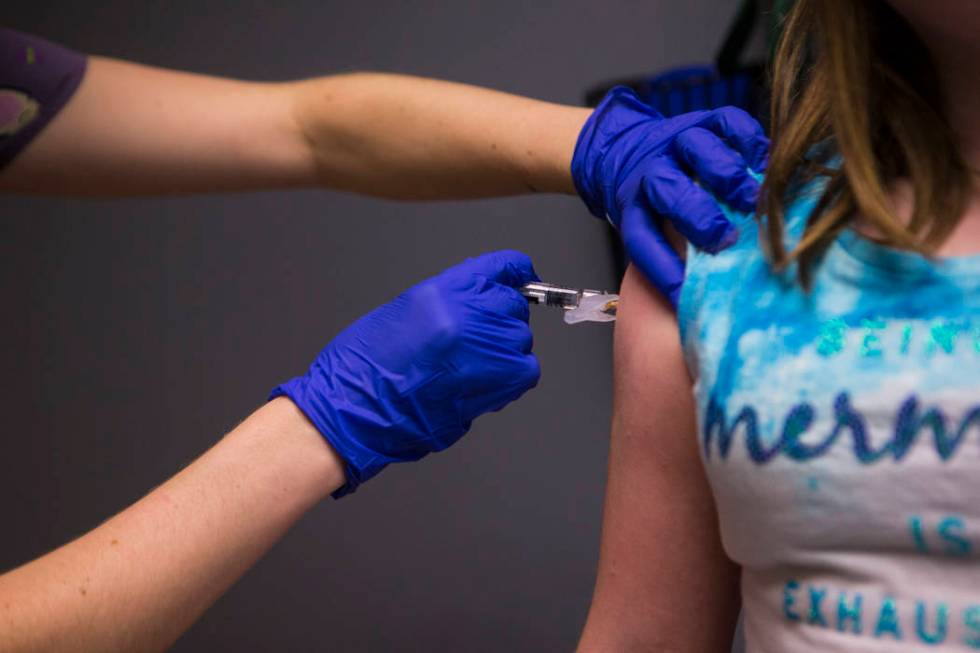Flu season peak has Las Vegas ERs, clinics straining to cope

Waiting rooms are filling up in emergency and urgent care facilities as a particularly pernicious flu season hits its peak in the Las Vegas Valley and nationwide.
For the first time in the Centers for Disease Control and Prevention’s 13-year flu surveillance history, flu activity was spread across the continental U.S. as 2018 began, with high activity in 27 states, including Nevada.
In Clark County, the virus had killed 10 people as of Jan. 6, including two children, and resulted in 476 hospitalizations, Southern Nevada Health District data show. That is double the number of flu deaths and more than three times the 142 hospitalizations over the same period last year.
“This is the highest flu activity that I’ve seen in at least the past 10 or 15 years,” said Jeffrey Murawsky, chief medical officer at Sunrise Hospital and Medical Center, which is affiliated with CareNow Urgent Care, operating 16 clinics in the valley.
The predominant flu strain this season the H3N2 virus. Though it’s covered by the flu vaccine, it’s more aggressive than the H1N1 strain, leading to more illness, hospitalization and death, said Michael Johnson, the health district’s community health director.
Wait times rise across the valley
The rough flu season has contributed to about a 10 percent increase in overall ER visits at Sunrise this winter, Murawsky said.
At University Medical Center’s nine Quick Care clinics, patient intake this winter has increased by up to 20 percent over last year, said Frederick Lippmann, a primary care doctor at UMC’s Peccole Ranch location on West Sahara Avenue.
“Thirty percent of all the patients we’re seeing in our clinic (have) influenza and flu-like symptoms, from children, to great-grandmas,” Lippmann said, adding that lately walk-in patients have typically had to wait about an hour before being seen.
Southwest Medical Associates’ six urgent care sites around the valley reported wait times from 45 minutes to two hours early Wednesday.
Emergency room wait times have recently been far longer, from four to seven hours, Lippmann said.
Johnson, the health district official, said area hospitals are straining but not breaking.
“None of this is taxing the system to the point where care isn’t being provided,” he said.
Patients are presenting with normal flu symptoms, like body aches, high fevers and extreme fatigue, Lippmann said. But more are complaining of a nasty cough than he’s used to seeing.
“I think the most curious thing is we’re seeing a larger group of patients that have done what we’ve asked” — they’ve been vaccinated, he said — “and they say, ‘Hey, how can I get the flu? I have the influenza vaccine.’”
Not too late to vaccinate
The vaccine, concocted to match what scientists think will be the predominant flu strain, isn’t protecting against H3N2 “as well as we needed it to,” Lippmann acknowledged.
That doesn’t mean people should forgo the flu shot. Although it’s too early to tell exactly how effective the vaccine was this season, Johnson said, it can still help protect against the disease and can dampen symptoms should you become ill.
You’re also taking one for the team by getting the shot, as those who can’t get the vaccine, like babies younger than 6 months or people allergic to the vaccine’s components, rely on herd immunity to keep them from getting sick. Those most at risk for complications related to the flu are children younger than 5, adults older than 65 and some people with chronic health conditions.
“I can’t emphasize enough,” Johnson said, “One, it’s not too late to vaccinate. Two, do what you can to stop the spread of germs,” like hand washing and covering your cough.
When to seek help
Patients with a headache, joint pain and a fever that won’t subside with over-the-counter medication, should get to the doctor, Lippmann said.
“The sooner you get the medicine you need, the better it is,” he said, adding that antivirals can be prescribed within 48-to-72 hours of the onset of symptoms.
People with other health issues like asthma or severe allergies shouldn’t wait to see a doctor.
“You’re not a hero for waiting it out,” Lippmann said. “We want you to be a hero for coming in and getting it taken care of.”
Contact Jessie Bekker at jbekker@reviewjournal.com or 702-380-4563. Follow @jessiebekks on Twitter.